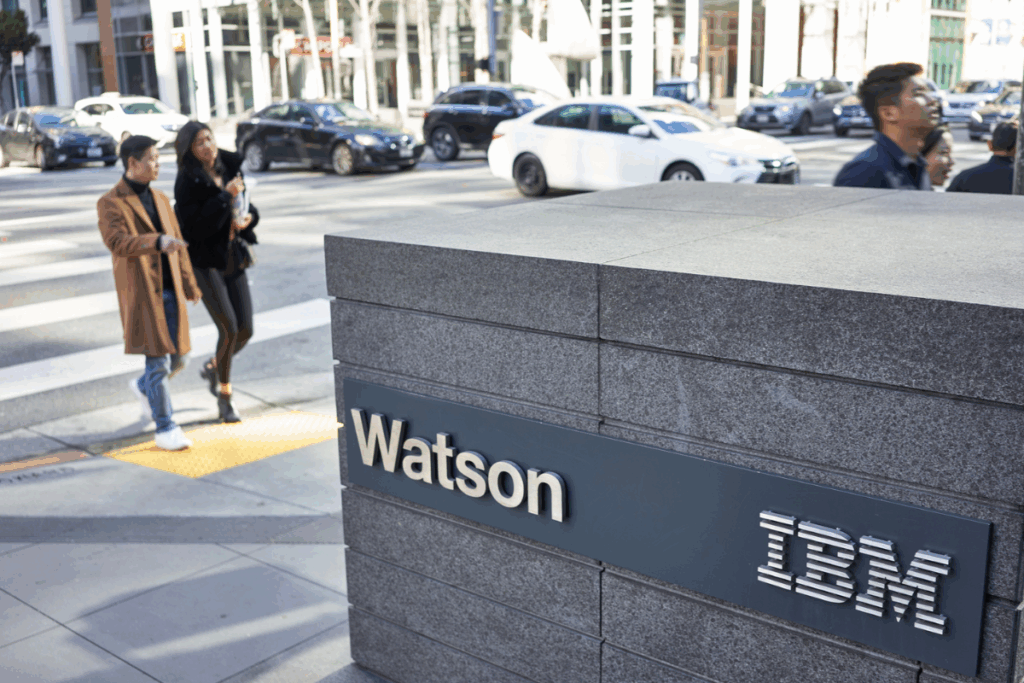Artificial Intelligence (AI) is transforming the landscape of modern business by providing innovative ways to streamline operations and enhance customer experiences. For small to medium-sized enterprises (SMEs) in the UK, AI presents a powerful tool to drive growth and empower teams. This guide offers practical advice on leveraging AI solutions in business while highlighting the importance of maintaining robust cyber security measures.
For those new to AI, our previous article ‘Beginner’s guide to AI‘ is a great starting point.
What is artificial intelligence and how does it work?
AI refers to the development of computer systems capable of performing tasks that typically require human cognition, such as visual perception, speech recognition, decision-making, and language translation. AI systems use machine learning algorithms to improve over time, transforming the way businesses operate across diverse sectors. Generative AI, a subset of AI, is used to develop creative content, such as text and images.
With that in mind, let’s look at a basic example and use-case. A retail company could use AI to analyse customer purchase patterns, enabling personalised product recommendations that improve customer experiences. This approach helps businesses adapt to consumer needs, optimise inventory, and boost sales through targeted marketing.
Why businesses use artificial intelligence (AI)
So why are so many businesses embracing artificial intelligence with open arms? It’s like having a secret weapon that supercharges productivity and streamlines operations, giving companies a real edge over the competition. Imagine freeing up your team from those repetitive tasks that eat up so much time and energy. With AI stepping in, your resources are liberated, allowing everyone to focus on the strategic initiatives that truly drive success.
AI is like having a data expert on your team, excelling at sifting through mountains of information, making sense of it all in ways that humans simply can’t match. Take financial firms, for example—they use AI to spot odd patterns in transactions, a powerful tool in the fight against fraud. This not only protects valuable assets but also builds trust with clients by ensuring secure transactions. And it doesn’t stop there. The marvels of computer vision are transforming industries, enabling machines to interpret and act on visual data, making everything from quality control to autonomous driving a reality.
In essence, AI is not just a technological advancement; it’s a strategic partner in making business more efficient, secure, and innovative. It’s about working smarter, not harder, and finding new ways to thrive in an ever-changing landscape.
The importance of AI in business
AI optimises business operations by automating processes and providing predictive analytics. AI-driven systems analyse large data sets in real-time, offering insights that help businesses make informed business decisions quickly. Integrating AI into business processes enhances efficiency, drives significant cost savings, and maintains a competitive edge.
In logistics, for example, AI predicts demand fluctuations and optimises delivery routes, ensuring efficient resource use and timely deliveries. This optimisation reduces fuel costs and improves customer satisfaction by meeting delivery expectations.
How AI can help optimise business operations
Task automation
Let’s talk about how AI is revolutionising the way businesses operate. Imagine having a tireless assistant that handles all those mundane, repetitive tasks that keep piling up. This is where AI really excels – task automation. It’s like having an extra set of hands working around the clock, allowing your team to focus on the big-picture strategies that really drive your business forward.
For example, robotic process automation (RPA) takes over tasks like data entry and responds to basic customer inquiries, increasing efficiency while reducing errors. It’s particularly handy in financial institutions, where automating transaction processes frees up staff to build stronger relationships with clients and tackle more complex problems.
Cost reduction
Now, consider the cost aspect. AI doesn’t just cut costs—it optimises them. Through predictive analytics, businesses can minimise waste and allocate resources more effectively. In the world of manufacturing, AI can even foresee equipment failures before they happen, reducing downtime and maintenance expenses.
When it comes to logistics, AI-driven supply chain management ensures everything runs like a well-oiled machine, getting deliveries out on time and cutting down on additional shipping costs.
Revenue increases
What about boosting revenue? AI can really be a game-changer here too. It enhances customer engagement by offering personalised experiences that resonate with each individual. Retailers, for instance, harness AI to dive deep into shopping behaviours and craft marketing campaigns that really work, driving up conversion rates. Think about Amazon’s recommendation engine—it’s a masterclass in AI at work, suggesting products you didn’t even know you needed, all based on your past purchases. Plus, AI-driven chatbots are like your first line of defence in customer service, handling basic queries with ease and freeing your human agents to tackle the more nuanced issues.
In essence, AI isn’t just a tool; it’s a partner in reimagining how businesses operate, helping them become more agile, efficient, and customer-centric.

AI-driven marketing: Campaigns to specific customers
AI can transform marketing and sales efforts by delivering insights that help target the right audience with the right message at the right time. By leveraging data, AI helps craft more effective campaigns and increase conversion rates.
Practical tips
Utilise predictive analytics
Set up AI tools like Salesforce Einstein or HubSpot to predict customer behaviour and identify sales opportunities. These tools can analyse historical data to forecast future trends, helping you make informed marketing decisions.
Automate lead scoring
Use AI to evaluate and prioritise leads based on their likelihood to convert. This ensures your sales team focuses on the most promising prospects, increasing efficiency and effectiveness.
A/B testing optimisation
Implement AI to automate and optimise A/B testing for marketing campaigns. AI can quickly analyse results and identify the most effective strategies.
Enhancing customer satisfaction
AI-powered customer service tools can revolutionise the way businesses interact with their customers. From chatbots providing immediate responses to AI systems personalising customer interactions, AI offers practical solutions for improving service quality and efficiency.
Practical tips
Implement AI chatbots
Start by integrating AI chatbots on your website or social media platforms. Tools like Zendesk or Intercom can be deployed to handle common inquiries, freeing up human agents for more complex issues.
Personalise customer interactions
Use AI to analyse customer data and personalise interactions. AI can track customer preferences and offer tailored product recommendations, enhancing the customer experience.
24/7 customer support
Ensure your AI services are available round-the-clock. This can significantly enhance customer satisfaction by providing support even outside business hours.
Implementing AI tools for automation
AI technologies can optimise operational processes by providing insights and automating routine tasks. This can lead to reduced costs, improved efficiency, and enhanced productivity.
Practical tips
Inventory management
Use AI to predict inventory needs and automate restocking processes. Tools like IBM Watson can analyse sales data to forecast demand, minimising waste and stockouts.
Supply chain optimisation
Implement AI to monitor and optimise supply chain operations. AI can identify bottlenecks and suggest improvements, ensuring smooth and cost-effective logistics.
Process automation
Automate repetitive tasks using AI-driven robotic process automation (RPA) tools. This reduces human error and frees up employees for more strategic tasks.
AI and cyber security: Protecting business data
Today, cyber security is the top priority for businesses. AI and automation play a crucial role in identifying and mitigating security threats. AI systems detect anomalies and potential vulnerabilities in real-time, enabling swift responses to attacks. By using AI for cyber security, businesses protect sensitive data and maintain system integrity.
Data encryption: Ensure all sensitive data is encrypted to protect against unauthorised access.
AI bias monitoring: Regularly audit AI systems to identify and correct biases, ensuring fair and ethical use.
Incident response plan: Develop and maintain a robust incident response plan to quickly address any security breaches.
Partner with experts: Work with an MSP like us to enhance your cyber security posture. We offer comprehensive security solutions to protect your data and ensure compliance with regulations like GDPR.
Real-world examples of companies using AI
Let’s take it one step further and look at some real-life examples of companies using AI that showcase the transformative power of this technology across diverse industries. These examples illustrate how AI can drive both business success and innovation.
Amazon
Amazon uses AI extensively in its operations, from enhancing customer experiences to optimising logistics. Its recommendation engine, powered by advanced AI algorithms, analyses customer browsing and purchase history to suggest products tailored to individual preferences, significantly boosting sales and customer satisfaction.
Additionally, AI-driven robots and predictive analytics streamline Amazon’s warehouse operations, reducing delivery times and improving inventory management.


Google leverages AI across its product suite, from search algorithms to language translation and voice recognition. Google Photos uses AI to organise and categorise images, enabling users to search for photos by recognising objects and scenes. Additionally, Google Translate utilises AI to provide accurate translations across numerous languages, breaking down communication barriers globally.
This innovative use of AI not only enhances driver safety but also sets the stage for fully autonomous vehicles in the future.
IBM Watson
IBM Watson is renowned for its AI capabilities in healthcare, where it assists doctors by analysing vast amounts of medical data to provide insights and treatment recommendations.
Watson’s natural language processing and machine learning capabilities enable it to support clinical decision-making, helping healthcare providers deliver personalised care and improve patient outcomes.


Starbucks
Starbucks uses AI to enhance customer experiences through its mobile app and personalised marketing strategies. The app utilises AI to recommend beverages based on previous orders and preferences, while predictive analytics help manage inventory and reduce waste.
This seamless integration of AI improves customer satisfaction and operational efficiency.
Zara
Fashion retailer Zara employs AI to optimise its supply chain and inventory management. By analysing sales data and market trends, AI helps Zara predict demand and adjust production accordingly, ensuring the right products are available at the right time.
This agile approach reduces overproduction and enhances the brand’s responsiveness to changing fashion trends.


Coca-Cola
Coca-Cola uses AI to drive marketing innovation and product development. By analysing social media and consumer feedback, AI helps Coca-Cola identify emerging trends and consumer preferences, informing new product launches and marketing campaigns. This data-driven approach allows Coca-Cola to remain competitive and relevant in the beverage industry.
This innovative use of AI not only enhances driver safety but also sets the stage for fully autonomous vehicles in the future.
Rolls-Royce
Rolls-Royce leverages AI for predictive maintenance in its aerospace division. By using AI to monitor engine performance data, Rolls-Royce can predict potential failures and schedule maintenance proactively, reducing downtime and improving the reliability of its engines.
This application enhances operational efficiency and customer trust in Rolls-Royce’s products.

These examples illustrate how AI is not just a futuristic concept but a vital component of modern business operations. Companies across various industries are harnessing the power of AI to innovate, optimise, and thrive in an increasingly competitive landscape. Whether it’s enhancing customer experiences, improving operational efficiency, or driving product innovation, AI is setting new benchmarks for business success.
Leveraging AI for better decision-making
AI enables businesses to optimise decision-making processes by providing data-driven insights and predictive analytics. It’s like having a super-powered analyst who can sift through complex data sets to forecast trends and spot golden opportunities. With AI in the mix, business leaders can make informed decisions that take strategic planning to the next level and lead to better business outcomes.
Take retail companies, for instance. They use AI to predict inventory needs by analysing seasonal trends and customer behaviour. This foresight ensures that stock levels are just right, avoiding those dreaded overstock or out-of-stock situations. Not only does this cut down on storage costs, but it also means customers always find what they’re looking for.
AI adoption steps in business
Thinking about bringing AI into your business? It’s a journey worth taking, and it starts with a few key steps. First, take a good look at your current processes and identify where AI can bring the most value. Develop a clear strategy for AI implementation, setting realistic goals and timelines that pave the way for success. Don’t forget to invest in your team—upskilling your workforce is crucial to ensure they’re ready to harness AI technologies. It’s about creating a culture that’s not just open to change but excited about it.
When it comes to practical implementation, starting small can be a smart move. Consider integrating AI into specific departments like marketing or customer service, where it can make an immediate impact. Once you see the benefits, you can scale up to an organisation-wide adoption. Partnering with AI vendors or consulting firms can also provide the expertise and support you need to make the transition smooth and successful.
How to integrate AI into your business strategy
Integrating AI into your business strategy isn’t just about adopting new technology—it’s about rethinking how your business operates. Begin by pinpointing areas where AI can really make a difference, whether it’s automating workflows or enhancing customer interactions. Empower your workforce by equipping them with the skills they need to work with AI and foster an innovative culture that embraces new ideas. By strategically implementing AI, you’re not just improving operations; you’re unlocking new opportunities for growth.
Engage stakeholders across your organisation to ensure everyone is on board and aligned with your AI initiatives. And remember, it’s a dynamic process. Regularly review and tweak your AI strategy based on performance metrics and feedback to keep improving and adapting to whatever the market throws your way.
Key takeaways
AI isn’t just a buzzword—it’s a powerful tool that can redefine the way your business operates and competes in the modern landscape. Here are the key takeaways to keep in mind as you consider integrating AI into your strategy:
Understanding AI: AI systems use machine learning algorithms to improve over time, transforming business operations across a wide range of sectors.
AI for efficiency: Leveraging AI can optimise workflows, automate repetitive tasks, and provide significant cost savings.
Customer experience: AI tools like chatbots improve customer satisfaction by offering personalised, 24/7 support.
Cyber security: AI and automation are crucial in detecting and responding to security threats, protecting business data.
Strategic integration: Successfully integrating AI into business strategy involves identifying opportunities, upskilling the workforce, and fostering a culture of innovation.
This guide aims to equip business leaders with a practical understanding of AI’s potential, offering actionable insights to effectively implement AI strategies within their organisations. Embrace this new technology to support business growth and stay ahead of the competition. For more insights, visit our ‘Beginner’s guide to AI’ to kickstart your AI journey.
Ready to explore how AI can transform your business and help you stay ahead of the competition? Get in touch with us today to discover how our expert advice on artificial intelligence in business can unlock new opportunities for your company.
How can we help?
Our comprehensive IT support and robust cyber security solutions are designed to secure your ventures as you embrace this new technology. Let us partner with you to harness the benefits of AI and ensure your business thrives in the modern landscape.
Contact us now to start your journey towards innovation and growth.




